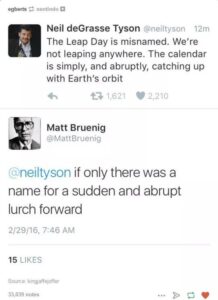 In all likelihood, you have seen or heard of the Twitter (now X) “debate” about how Leap Day is misnamed. Scientist Neil deGrasse Tyson argues that “we’re not leaping anywhere. The calendar is simply, and abruptly, catching up with the Earth’s orbit.” To which Matt Bruenig, someone I’ve never heard of, replied, “if only there was a name for a sudden and abrupt lurch forward.”
In all likelihood, you have seen or heard of the Twitter (now X) “debate” about how Leap Day is misnamed. Scientist Neil deGrasse Tyson argues that “we’re not leaping anywhere. The calendar is simply, and abruptly, catching up with the Earth’s orbit.” To which Matt Bruenig, someone I’ve never heard of, replied, “if only there was a name for a sudden and abrupt lurch forward.”
I’m assuming Mr. Bruenig thinks that “leap” means a sudden and abrupt lurch. He would be wrong.
What is a Leap?
According to my go-to source Dictionary.com, the verb leap is “to spring through the air from one point or position to another; jump”; while the noun is “to jump over.” No abrupt lurches involved. (And, by definition, a lurch is abrupt, so Mr. Bruenig is redundant as well as wrong.)
According to the Central NY News, the word for adding time to a calendar is “intercalation.” Admittedly, “Intercalation Year” is a bit awkward.
The article goes on to explain that a leap year is so called because all the days in the calendar advance two days instead of one after the addition of February 29th. So, if my birthday was on a Sunday in 2023, it will leap over Monday and be on Tuesday in 2024. And that makes some sense.
And yet…
There Is No Leap
As Tyson said, the calendar is catching up with the Earth’s orbit. We are not skipping or jumping over anything. Instead, we are admitting the fact that a trip around the sun is, in fact, longer than 365 days and we’ve gotten behind.
 Inane Trivia Alert
Inane Trivia Alert
Earth’s orbit around the sun is 365 days, 6 hours, and 9 minutes. That 9 minutes loves to play havoc with leap years. Nominally, to account for those minutes, leap years are skipped every 100 years. So, 1900 did not have a leap day. Why did 2000 have one? Because 9 minutes. Centuries divisible by 400 (such as the year 2000) do get to keep their leap day.
Now What?
Well, I’m not sure there is a single word in the English language that covers all that is a leap year. I just know that “leap” would not have been my choice. Alas, since it seems to be set in the vernacular, we are stuck with it.
– Lorrie Nicoles



